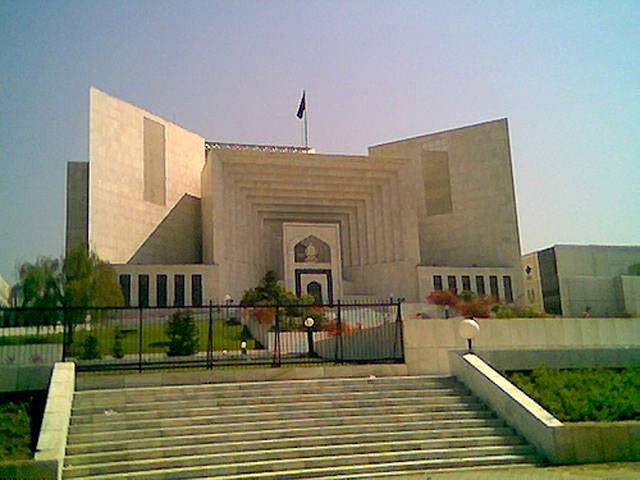SC to examine ‘legal immunity’ to army officials

ISLAMABAD- The Supreme Court has observed that Criminal Procedure Code (CrPc) or any other law does not bar police from registering FIR against armed forces officers.
A two-member bench, headed by Justice Jawwad S Kahwaja and including Justice Ejaz Afzal, heard the cases of missing persons on Thursday.
In response to contention of Military Intelligence (MI) that superior courts and police have no jurisdiction to proceed against any serving army officer, Justice Ejaz Afzal made it clear that CrPc does not prevent registration of cases against accused army officials.
The court sought comprehensive plan from the federal government about the person being detained at the internment centres on July 17.
The police on the complaint of Abida Malik, whose husband Tasif Ali went missing on November 23, 2011, had registered an FIR 386/13 at Sadiqabad Police Station of Rawalpindi against Major Haider.
Representing MI, Ibrahim Satti objected to the registration of case against a serving army officer. He said the army officers have special status and asked that how come the police could register a case against a serving army officer and arrest him.
When Justice Khawaja pointed out that every citizen has a special status in the constitution and everyone was loyal to the state. The MI consul contended that the oath of armed forces officials does not have the words “to defend and protect the constitution”. He also stated that General (r) Pervez Musharraf as Army Chief was not under oath to protect the constitution.
It is noteworthy, the oath of president, prime minister, federal and state ministers, chief ministers, governors, members of national/provincial assemblies, speaker and deputy speaker of national/provincial assemblies, and judges of SC, high courts and Supreme Court contain the words, “I will preserve, protect and defend the constitution of the Islamic Republic of Pakistan.”
Satti said that Supreme Court has the power to strike any law that was contrary to the fundamental rights enshrined in the constitution, but not judge the Army Act 1952 on the touchstone of fundamental rights. Justifying the need for maintaining the prerogatives of the army officials, he pointed out that more than 500 suicide attacks have been carried out in the country.
“I want to know who these persons (suicide attackers) are as I think huge amount is being spent on intelligent agencies in this regard,” Justice Jawwad asked him. Satti said these suicide attackers might be the missing persons.
The counsel referred to the Article 63(1g), which says a parliamentarian would be disqualified if he defames or brings into ridicule the judiciary or the armed forces of Pakistan, and contended that applications about the missing persons in the Commission made on the subject and the SC ridiculed Pak Army. He also said that armed forces officials were performing duties for the protection of boarders.
Upon that the court remarked they were being paid for performing their duties. Justice Jawwad S Khawaja also said that they were more concerned about the integrity of the Pak Army; therefore, they had expressed concern over the United Nations Working Group on Enforced Disappearances in Islamabad. “How can we allow UN office to malign our intelligent agencies? Therefore, we have taken this matter seriously.”
The hearing of the case was adjourned until today (Friday) while the MI counsel would continue his arguments. Attorney General for Pakistan Muneer A Malik would also submit his formulations about the jurisdiction of apex court as well as police regarding armed forces officials. The court also observed that it is an important question and they would decide it.
Meanwhile, touching scene was witnessed in the courtroom when an attendant revealed the miserable condition of his brother, who is being detained at an internment centre in Lakki Marwat. Ziaullah told the court that his brother Fasihullah had told him that they were given only one roti in a day. He also said that he was not allowed to provide food to his brother. “After seeing my brother in miserable condition, I wish I had not met him,” he added.
Upon this, Justice Ejaz Afzal asked Additional Attorney General for Pakistan Tariq Khokar that why they did not ask the authorities at internment centres to abide by the law as it is their duty to provide basic facilities to the detained people. The court said it would order for producing the detained people before the bench to examine their condition.





